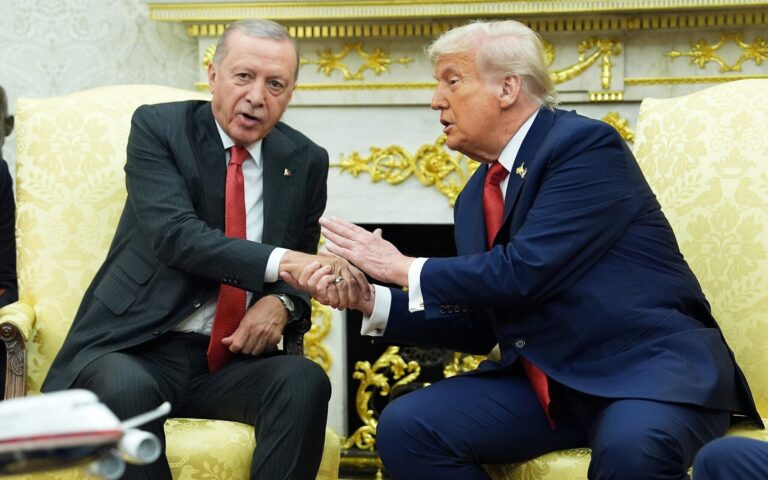Transformative Talks in Washington: Redefining U.S.-Turkey Relations
In a significant diplomatic engagement held in Washington, U.S. President Donald Trump and Turkish President Recep Tayyip Erdoğan convened to discuss pivotal issues that could redefine the trajectory of bilateral relations and influence regional geopolitics. Their dialogue spanned critical areas such as security collaboration, economic partnerships, and regional conflict resolution, offering a fresh perspective on the evolving alliance between the United States and Turkiye. This article distills four essential insights from their summit, exploring the broader implications for international diplomacy and strategic cooperation.
Renewed Diplomatic Engagement Signals a New Chapter in U.S.-Turkiye Relations
The recent summit between Trump and Erdoğan represents a marked shift in the diplomatic landscape between the two nations, moving away from previous periods marked by tension and strategic discord. Analysts observe a subtle yet meaningful thaw, reflecting Erdoğan’s intent to elevate Turkey’s role as a key regional and global actor. Concurrently, Trump appears motivated to capitalize on this partnership to reinforce his administration’s foreign policy achievements and domestic standing.
Key elements shaping this evolving relationship include:
- Energy Sector Collaboration: The leaders explored expanding cooperation in natural gas infrastructure and renewable energy initiatives, aiming to diversify Europe’s energy sources and reduce reliance on Russian supplies.
- Defense and Security Alliances: Renewed commitments to military partnerships were emphasized, including discussions on advanced arms sales and technology exchanges.
- Regional Conflict Management: Joint efforts to address instability in Syria and Libya were prioritized, focusing on counterterrorism and diplomatic conflict resolution.
- Trade and Investment Enhancement: Proposals to lower trade barriers and stimulate bilateral investments indicate a mutual interest in deepening economic integration.
| Sector | Focus Area | Expected Outcome |
|---|---|---|
| Energy | Pipeline Development & Renewable Projects | Enhanced Energy Security & Market Diversification |
| Defense | Arms Procurement & Technology Sharing | Stronger Military Cooperation |
| Diplomacy | Coordinated Regional Policies | Conflict De-escalation |
| Trade | Tariff Reduction & Investment Promotion | Economic Expansion |
Prioritizing Security and Stability: Core Themes of the Washington Dialogue
The Washington discussions placed a strong emphasis on fortifying security frameworks to tackle persistent regional threats. Both presidents highlighted the necessity of enhanced counterterrorism collaboration, including improved intelligence exchange and coordinated operations. Additionally, they addressed the challenge of illicit arms trafficking, aiming to establish mechanisms that would contribute to sustained peace in conflict-prone border areas.
Highlights from the security-focused talks included:
- Deepening military collaboration to reinforce defense readiness and interoperability.
- Developing joint approaches to manage refugee crises and deliver humanitarian assistance effectively.
- Commitment to ongoing diplomatic engagement to resolve regional disputes peacefully.
- Formulating economic-security frameworks that align development goals with stability objectives.
Revitalizing Economic Ties: Trade and Investment on the Agenda
The summit also marked a renewed focus on strengthening economic relations between the United States and Turkiye. Both leaders expressed a shared determination to dismantle trade obstacles and boost investment flows, particularly in sectors such as energy, technology, and infrastructure development. This strategic economic alignment aims to leverage the complementary strengths of both nations to navigate global market challenges more effectively.
Key economic initiatives discussed include:
- Lowering tariffs and easing trade restrictions to facilitate smoother commercial exchanges.
- Collaborative renewable energy projects to advance sustainability and green growth.
- Expanding cooperation in the digital economy, focusing on innovation hubs and technology transfer.
- Supporting small and medium-sized enterprises (SMEs), enhancing their access to new markets.
| Sector | Initiative | Impact |
|---|---|---|
| Energy | Joint investments in natural gas and renewables | Greater energy independence and sustainable growth |
| Technology | Establishment of innovation centers | Enhanced global market competitiveness |
| Infrastructure | Development of transport and logistics corridors | Improved trade connectivity and efficiency |
Strategic Recommendations to Fortify U.S.-Turkiye Relations
To build on the momentum generated by the Washington meeting, policymakers should focus on fostering a transparent and trust-based partnership. Establishing dedicated bilateral committees for defense and economic collaboration can institutionalize dialogue and ensure sustained progress. Moreover, promoting cultural and educational exchanges will nurture deeper interpersonal connections, laying the groundwork for enduring goodwill beyond official channels.
- Initiate biannual strategic forums encompassing defense, trade, and energy sectors to maintain continuous engagement.
- Strengthen intelligence-sharing frameworks with robust safeguards to uphold national sovereignty.
- Expand joint counterterrorism training programs to effectively address evolving security threats.
- Invest in cultural and academic exchange programs to foster mutual understanding among future leaders.
| Policy Area | Immediate Steps | Anticipated Benefits |
|---|---|---|
| Defense | Conduct joint military exercises | Enhanced operational coordination |
| Economic Relations | Launch trade missions to promote commerce | Expanded market opportunities for SMEs |
| Cultural Exchange | Sponsor scholarship and exchange programs | Stronger interpersonal and cultural ties |
Overcoming existing challenges will require innovative approaches that balance geopolitical interests with the pursuit of regional stability. Encouraging Turkiye’s proactive engagement in multilateral organizations through tailored economic and security incentives can facilitate smoother cooperation. Additionally, maintaining open communication channels to address disagreements promptly will help prevent misunderstandings and build lasting trust. If these strategies are pursued diligently, they could transform short-term agreements into a durable and strategic partnership.
Final Thoughts
The Washington summit between President Donald Trump and President Recep Tayyip Erdoğan illuminated the multifaceted nature of U.S.-Turkiye relations amid a complex global environment. Their discussions on security collaboration, economic integration, and diplomatic engagement underscore the potential for a recalibrated partnership that addresses both nations’ strategic priorities. As the international community watches closely, the real test will be how these high-level dialogues translate into actionable policies that shape the geopolitical landscape in the coming years.







